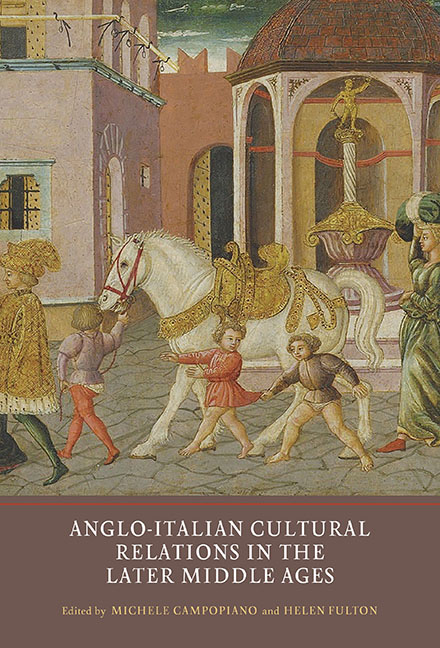Book contents
- Frontmatter
- Contents
- List of Illustrations
- List of Contributors
- Acknowledgements
- List of Abbreviations
- Introduction: Historical and Literary Connections between Britain and Italy in the Middle Ages
- 1 Writing, Translating and Imagining Italy in the Polychronicon
- 2 Richard de Bury, Petrarch and Avignon
- 3 The Reception of Italian Political Theory in Northern England: Bartolus of Saxoferrato and Giles of Rome in York
- 4 Italian Firms in Late Medieval England and their Bankruptcy: Re-reading an Old History of Financial Crisis
- 5 ‘Nostri Fratelli da Londra’: The Lucchese Community in Late Medieval England
- 6 ‘Saluti da Londra’: Italian Merchants in the City of London in the Late Fourteenth and Early Fifteenth Centuries
- 7 Political Joachism and the English Franciscans: The Rumour of Richard II's Return
- 8 Urban History in Medieval and Early Modern Britain: The Influence of Classical and Italian Models
- Afterword: The Nature of Anglo-Italian Cultural Exchanges
- Bibliography
- Index
5 - ‘Nostri Fratelli da Londra’: The Lucchese Community in Late Medieval England
Published online by Cambridge University Press: 03 July 2019
- Frontmatter
- Contents
- List of Illustrations
- List of Contributors
- Acknowledgements
- List of Abbreviations
- Introduction: Historical and Literary Connections between Britain and Italy in the Middle Ages
- 1 Writing, Translating and Imagining Italy in the Polychronicon
- 2 Richard de Bury, Petrarch and Avignon
- 3 The Reception of Italian Political Theory in Northern England: Bartolus of Saxoferrato and Giles of Rome in York
- 4 Italian Firms in Late Medieval England and their Bankruptcy: Re-reading an Old History of Financial Crisis
- 5 ‘Nostri Fratelli da Londra’: The Lucchese Community in Late Medieval England
- 6 ‘Saluti da Londra’: Italian Merchants in the City of London in the Late Fourteenth and Early Fifteenth Centuries
- 7 Political Joachism and the English Franciscans: The Rumour of Richard II's Return
- 8 Urban History in Medieval and Early Modern Britain: The Influence of Classical and Italian Models
- Afterword: The Nature of Anglo-Italian Cultural Exchanges
- Bibliography
- Index
Summary
During the late medieval period, Italian merchants visited England to import luxury items, export wool and cloth and engage in banking operations. Whereas most of these traders spent only short periods in the country, some stayed for longer and formed proper communities. Despite their economic importance, the internal organization of these merchant groups in England has remained largely under-studied. Much more is known about the workings of the Italian communities in late medieval Bruges, the commercial powerhouse on the other side of the Channel, in the county of Flanders. In 1949, for example, the American economic historian Raymond De Roover published a comprehensive article on the merchants of Lucca in the city. De Roover drew on the Libro della comunità dei mercanti Lucchesi, the daily register of the Lucchese community in Bruges, and reconstructed its composition, its organization and the activities of its members.
Evidence for England is much more fragmented and far less detailed, and does not, in itself, allow a similar study. What is usually overlooked, however, is that the Libro della comunità often deals with the activities of ‘our brothers of London’, as the Lucchese in Bruges called their compatriots across the Channel, as well. References to the work and lives of Lucchese merchants in the British Isles can also be found in the collections of the Archivio di stato in Lucca. When pieced together with the scattered English records, these sources give us a surprisingly clear view of the business of one of the most important foreign trading groups in late medieval England. In addition, the activities of merchants and bankers from Lucca can be linked to the often much better documented achievements of Lucchesi outside the commercial sphere. This chapter includes a case study of the Gigli family, who entered England as businessmen but left their most enduring mark as dignitaries of the Church.
Lucchese trade and banking in England
Just like their Florentine fellow traders, Lucchese merchants were eager buyers of high-quality English wool and, increasingly over the course of the late medieval period, English cloth. The main purpose of their visits to the British Isles, however, was the sale of silks.
- Type
- Chapter
- Information
- Anglo-Italian Cultural Relations in the Later Middle Ages , pp. 87 - 102Publisher: Boydell & BrewerPrint publication year: 2018

